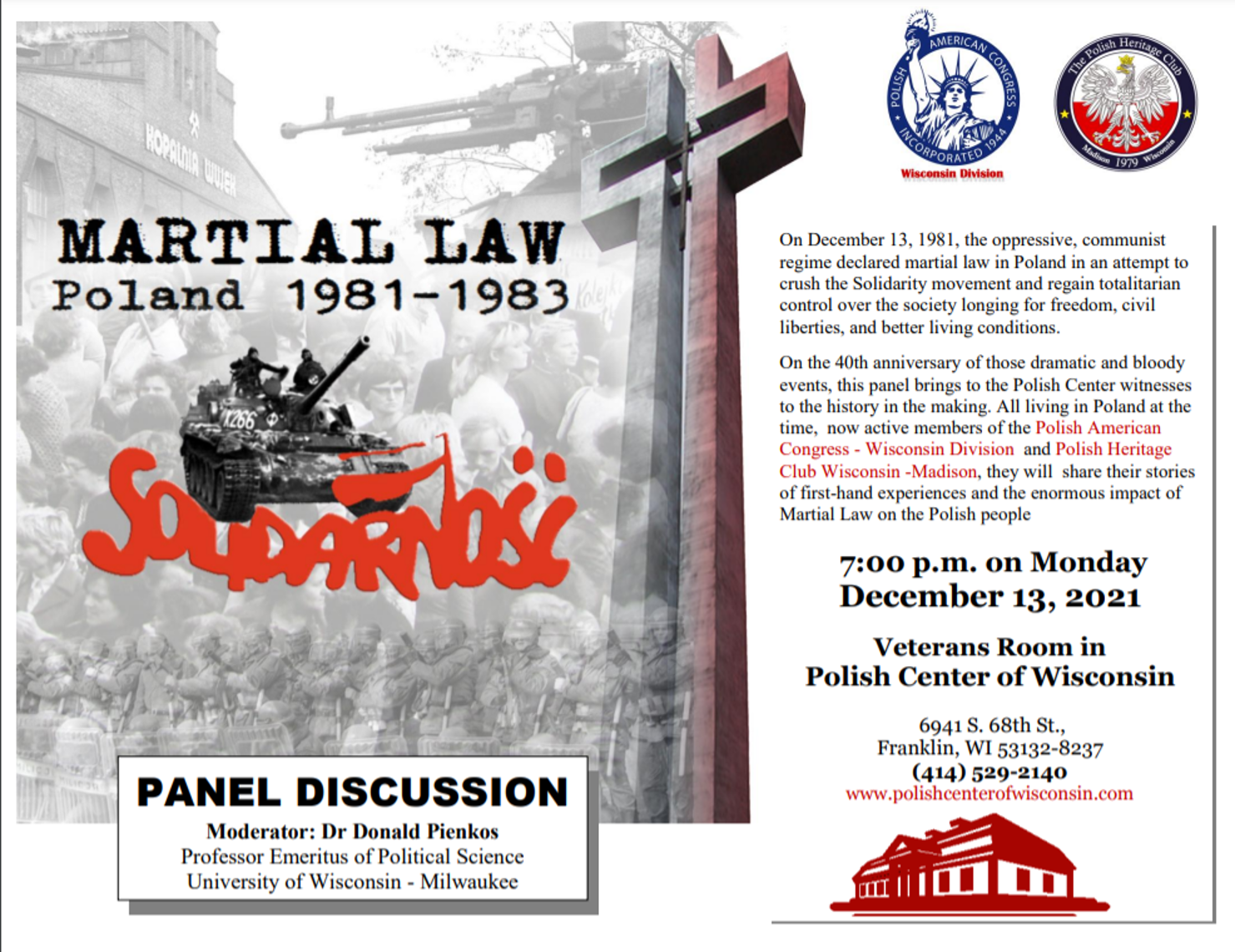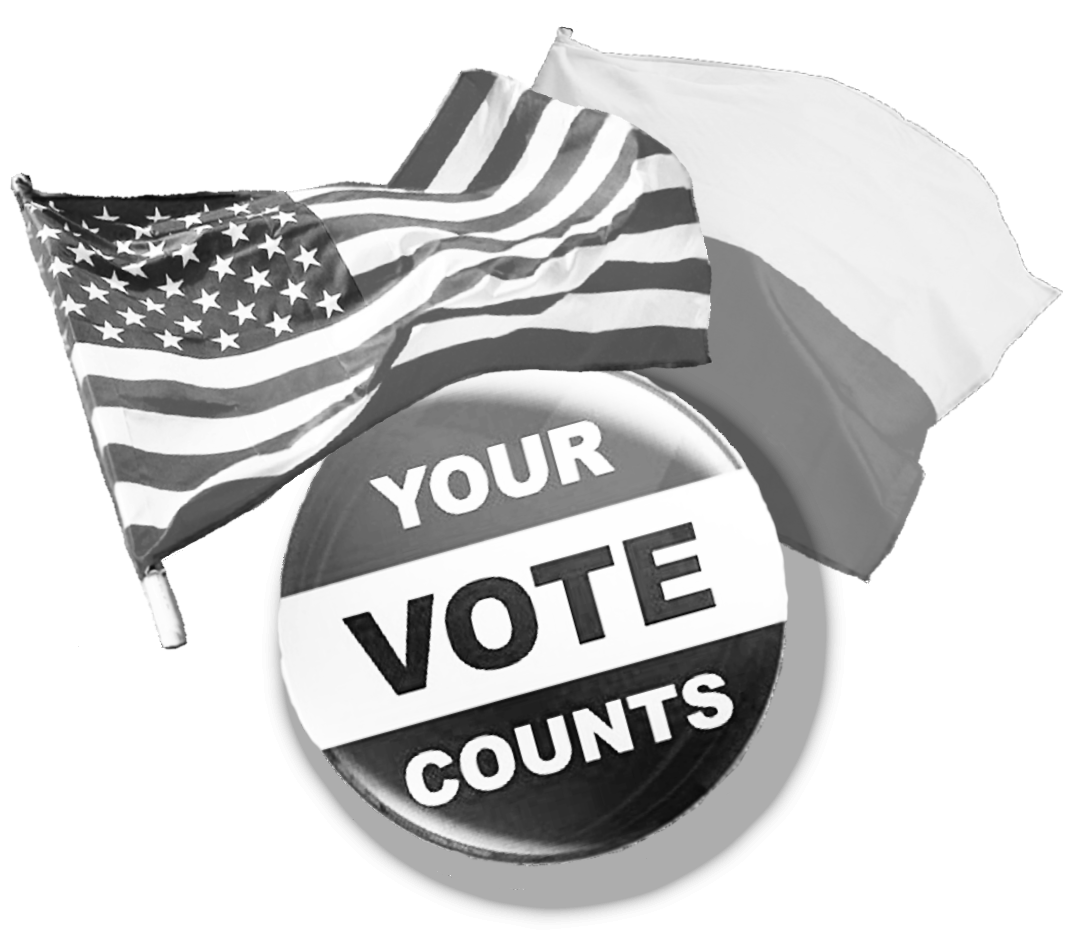2021 Panel Discussion: Martial Law. Poland 1981-1983 (invitation)
Polish American Congress invites all to the panel discussion held in remembrance of martial law declared in Poland on December 13, 1981.
If unable to join us at the Polish Center of Wisconsin, we encourage everyone to kindle the Light of Freedom on Monday, December 13th 2021 exactly at 7.30 pm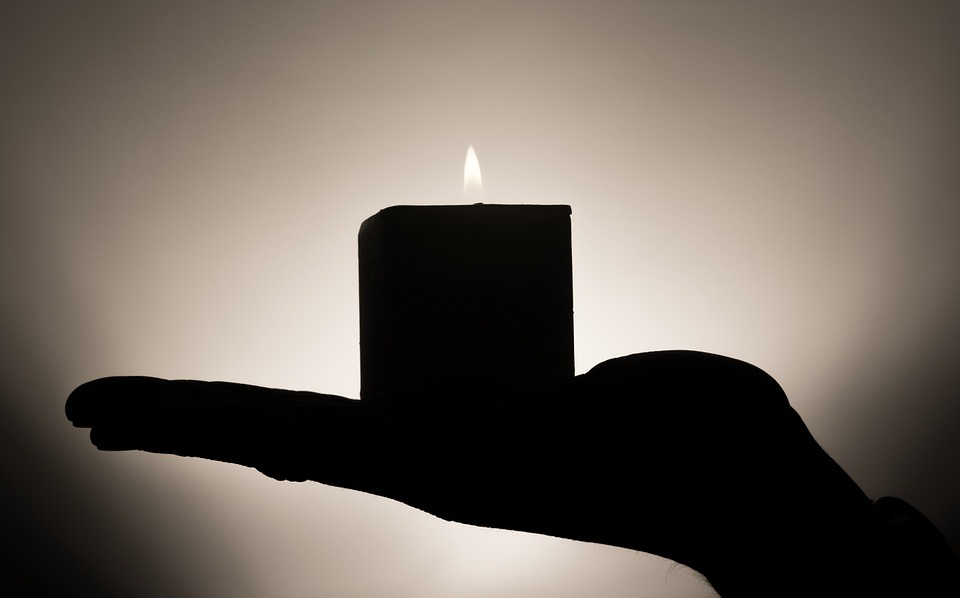
Forty years ago, the Polish Pope John Paul II lit a candle in a Vatican window in solidarity with his homeland, the then US President Ronald Reagan placed a lighted candle in a White House window and called upon the Americans for a similar gesture of unity with the victims of martial law. …In all, millions of Americans placed candles in their windows.
On December 13, 1981, the oppressive, communist regime declared martial law in Poland in an attempt to crush the Solidarity movement and regain totalitarian control over the society longing for freedom, civil liberties, and better living conditions.
On the 40th anniversary of those dramatic and bloody events, this panel brings to the Polish Center witnesses to the history in the making. All living in Poland at the time, now active members of the Polish American Congress – Wisconsin Division and Polish Heritage Club Wisconsin -Madison, they will share their stories of first-hand experiences and the enormous impact of Martial Law on the Polish people.
This event is free and open to the public
► Map of Location ◄ …………..► Printable Flyer◄
For additional information, please contact
David Rydzewski at (414) 964-2447 or david.rydzewski@att.net
2021 Solidarity: Underground Publishing and Martial Law 1981-1983
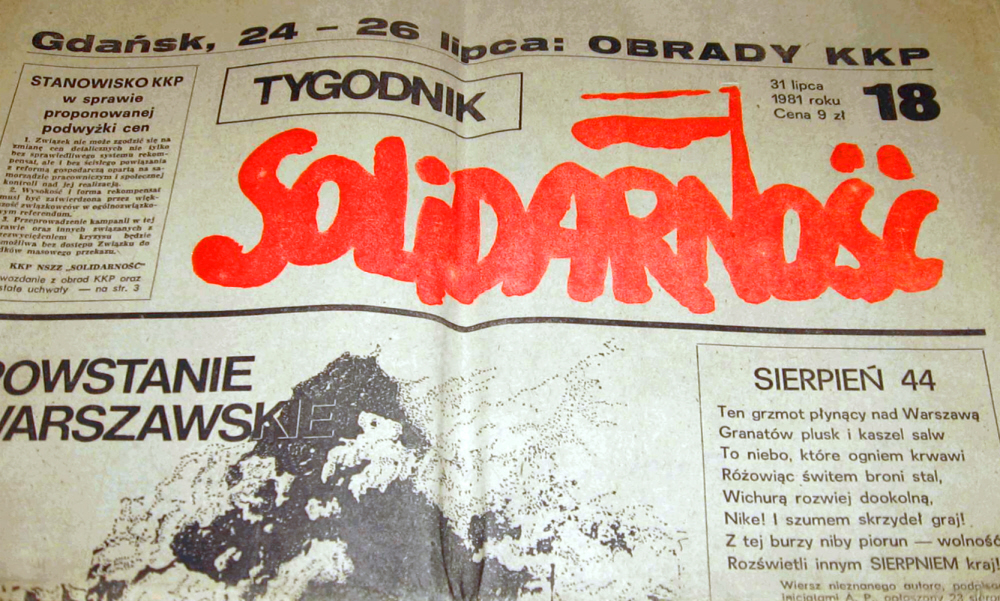
REMEMBERING SOLIDARITY 1980-1981
Through the Lens of Independent Publishing
& Martial Law Imposed on December 13, 1981
August 31, 1980, marked the 40th anniversary of the birth of Polish Solidarity. On that day in 1980, the landmark August Agreement was signed between then the communist government of Poland and the Interfactory Strike Committee (Międzyzakładowy Komitet Strajkowy, MKS) formed on the third day of strike that erupted in Gdańsk shipyard on August 14, 1980. About 16,000 shipyard employees joined the protest but within a couple of weeks, around 1 million workers all over Poland went on strike as well. In this way, one of the biggest strikes ever ensued and the MKS became an alliance of numerous independent organizations. When signing the August Agreement on August 31, 1980, it represented about 3 million workers from nearly 3,500 enterprises. The rest of Poland was holding breath in hope that this rise will end in victory rather than a bloody finale like other strikes before.
For more about Solidarity movement, visit Professor D. Pienkos’ story
The Amazing Story of Solidarity Begins – 40 Years Ago
The firing of Anna Walentynowicz for her illegal trade union activity was a spark that ignited the 1980 strike in the Gdańsk shipyard but root causes run much deeper. Of course there were hikes of food prices and shortages of nearly everything – the ominous signs of economy on the verge of collapse. Living in Poland until 1983, I will never forget the dread of food rationing, the humiliation of standing in endless lines, or the misery of waiting 16-20 years for the already paid off apartment. Available in abundance, however, was the devious misinformation and stupefying propaganda spewed by the government controlled media. For me personally, a symbolic image of that reality was a neighborhood store with empty shelves and a few bottles of vinegar sitting on the counter next to a big pile of the state-run newspaper.
Striking workers wanted to participate in the process of taking the country out of the crisis and this desire was articulated as part o the famous list of 21 demands issued on August 17, 1980 and posted on the shipyard’s gate. After the government signed off on these demands on August 31, 2020, the nationwide labor union Solidarity (Solidarność) was registered on September 24, 1980. Amid the euphoria sweeping the country, Solidarity kept growing fast with students, intellectuals, farmers, and professionals joining its ranks. In September 1981, it had about 10 million members (in a country with a total population of 35.5 million). Moreover, surrounding its trade union core, Solidarity became a de facto social movement and one of its most important imprints was exerted in the area of what became available for people to read.
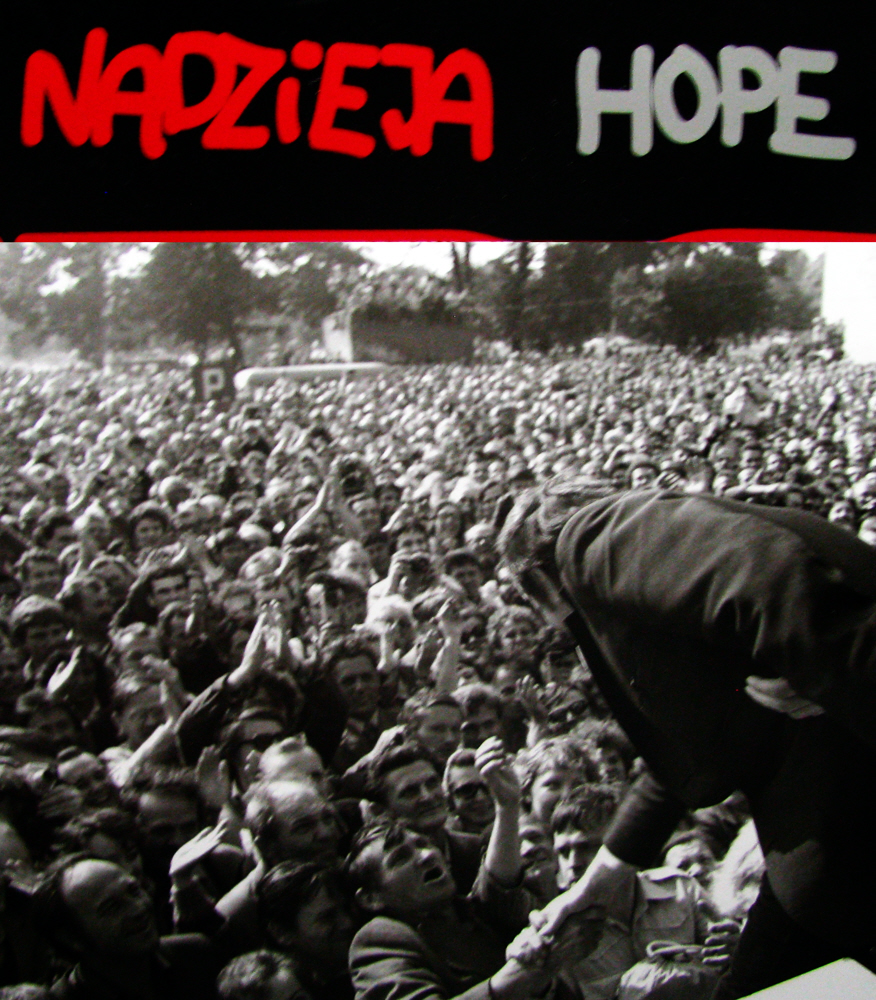
The all-pervasive euphoria on display during meeting with leaders of the strike in the Gdańsk shipyard (Panel from the Solidarity exhibit, brought to Madison in 2012 and co-sponsored by PHC-Madison)
The MKS recognized the importance of access to reliable sources of information by placing the freedom of speech, the press and publication as No. 3 on the famous list of 21 demands issued on August 17, 1980. To be clear, the Polish Constitution of 1952, then in effect, already guaranteed the freedom of speech and the press, along with other rights observed in civilized societies. Yet, the Polish United Workers’ Party (PZPR) ruled the country based on its own statutes – constitution was relegated to the role of a legitimacy smokescreen. The cornerstone of the PZPR rule was its strict control over information needed to subdue people into submission. Relentless censorship was the rule of the day, creating a market for the underground publishing – and in this area, Poland had strong traditions going back about 200 years.
Books and periodicals published underground were known as bibuła (literally in Polish, a blotting paper) or drugi obieg (second circulation), where first circulation meant censored publications. In terms of volume, the British Library estimates that about 3,000-4,000 independent periodicals and over 6,000 books and pamphlets were published between 1976 and 1990. The main organizers of the underground publishing before Solidarity was born included the Movement for Defense of Human and Civic Rights (ROPCiO) and Workers’ Defense Committee (KOR). It is thanks to their activities – such as helping to smuggle printing supplies from abroad or obtain them illegally from the official publishing houses – that the underground publishers of various sizes could flourish.
Entering the Solidarity era, the volume of independent publications skyrocketed, while their profile changed from the predominantly book-oriented to the one focused on periodicals and other more or less serial news publications produced in nearly every corner of Poland. Although rarely prosecuted, vast majority of them was still published illegally or semi-legally – with help of printing supplies flowing in from sympathetic trade unions in the West. Circulation varied from hundreds in smaller workplaces to 30,000 for the newsletter published in the Gdańsk shipyard during the strike.
Only two periodicals received the governmental consent. The weekly Unity (Jedność) was published in Szczecin until December 1981, with circulation up to 150,000 for some special issues. On the other hand, the Solidarity Weekly (Tygodnik Solidarność, see image near the title), led by Tadeusz Mazowiecki (later the prime minister of Poland, 1989-1990), reached circulation of 500,000. These numbers could easily be higher but the governmental approval came at the price. One was that paper rationing was limiting the number of printed copies. Another price to pay was that despite a significant leeway, both magazines were still subjected to censorship.
The lively publishing activities came to a screeching halt when the next first secretary, General Wojciech Jaruzelski – unable to fix the economy and prevent further disintegration of the communist system – declared the martial law on Sunday, December 13, 1981. In the pitiless crackdown on the Solidarity movement, thousands of tanks and armored combat vehicles hit the roads, along with over 100,000 soldiers and state police unleashed to squash any forms of resistance. Solidarity was stripped of its legal status. Over 10,000 people (primarily Solidarity members) ended locked up in the internments camps. The independent printing equipment was seized, radio and TV stations besieged, and telephone lines cut off under the pretext of preventing the “spread of misinformation.”
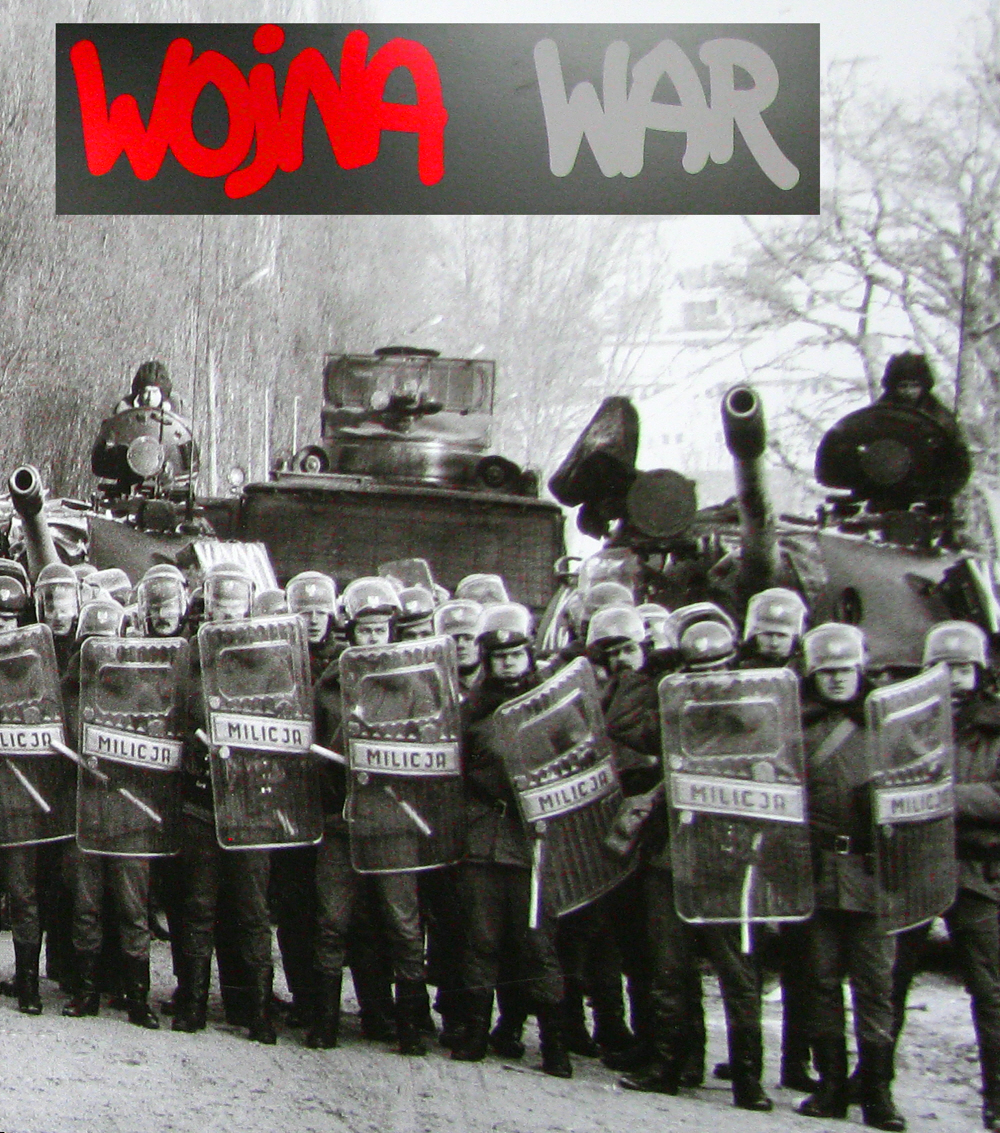
Riot troops called ZOMO (Motorized Reserve of the Citizens’ Militia) and military ready to attack the workers striking in the Gdańsk shipyard on December 16, 1981 (Panel from the Solidarity exhibit, brought to Madison in 2012 and co-sponsored by PHC-Madison)
As surprising as it may seem, the damage to the publishing base proved to not last long, and at that time my encounters with Solidarity publications became more personal. Until the Solidarity regrouped and underground publishing resumed, humble typewriters were used to patch up the information void. Thousands of anonymous volunteers – including myself – painstakingly re-typed the information bulletins in as many carbon copies as typewriters would handle.
Of course, getting caught copying, or even possessing these materials, was fraught with risk of harsh punishments. I came dangerously close to finding out what they would be when one day the house where I was doing the typing was raided and searched. Everything happened so quickly that I managed only to shove the typewriter into the nearest closet (by the way, totally empty, not even one piece of cloth to use as a cover). There was also no time to remove the paper load, the incontrovertible evidence of my “misdeed.” I was mortified when three soldiers and three policemen entered the room because the typewriter’s discovery was inevitable.
Luckily for me, the gossips circulating about some soldiers having courage to side with the people proved true. The soldier ordered to check the closet started opening its sliding door, stopped moving it as soon as he saw what’s inside, gave me a long gaze, and then simply announced: “Clear!” I will never know why he did what he did but as it turned out later, one of my in-laws was the actual reason for the ride. A lawyer for years providing his services in defense of arrested demonstrators, he went into hiding after avoiding arrest on December 13 by a sheer stroke of luck.
My second brush with danger related to the possession of illegal printed matter occurred in September 1983, just few weeks after the martial law was officially lifted on July 22, 1983 (although in one form or another it persisted for next 2-3 years). Heading for the United States, I arrived at the Okęcie Airport in Warsaw with a suitcase containing several pounds of underground publications hiding under a layer of scientific papers. The view extending from the airport’s upper gallery was scary. Down below was the main hall converted into a huge check-in area, where custom and security officers tenaciously ploughed through the piles of personal possessions removed from suitcases on the long rows of tables. Yet, I descended down with some irrational hope that somehow, I will make it through. And I did…
Today these materials are a part of the Solidarity Collection, held in the Memorial Library of the University of Wisconsin-Madison – preserving the memory of people working hard and risking their freedom for a just cause.
Irena Frączek
Reprint from the newsletter published by the Polish Heritage Club, Wisconsin Madison
2021 Polish Independence Day and Veterans Day
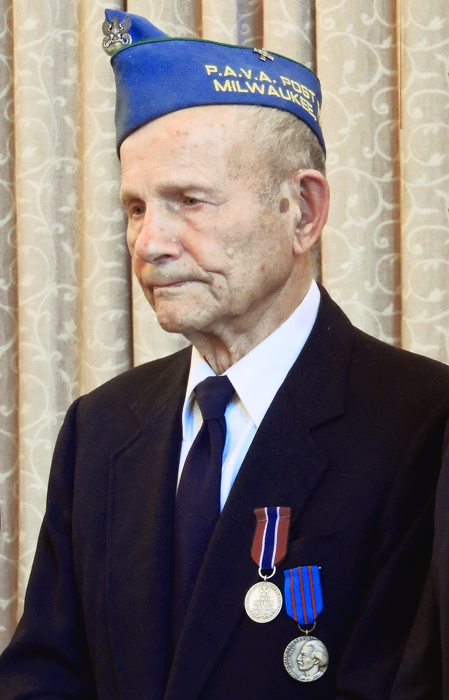 Ted (Tadeusz) Cisek, the veteran granted the PAC-Wisconsin Division honorary membership on November 7, 2021
Ted (Tadeusz) Cisek, the veteran granted the PAC-Wisconsin Division honorary membership on November 7, 2021
…
2021 Polish Independence Day
and Veterans Day celebration
Irena Frączek reports……
“From the lessons learned in Poland’s over 100 year history and from the diligence and hard work of its citizens, today it has one of the most vibrant economies in all of Europe. For Polish Americans we can be very proud of that, as we gather together today to honor our heritage, and to recognize Poland’s past, its present, and prayerfully a bright long and successful future.”
With these words, the President of Polish American Congress (PAC) Wisconsin Division, David Rydzewski, concluded his main address delivered at the luncheon held annually since 1979 to celebrate the Polish Independence Day (in Polish, Narodowe Święto Niepodległości) and Veterans Day, both observed officially on November 11th.
The 2021 event will be remembered for its particularly cheerful ambiance, a standing ovation for one of the 2021 honorees and the evident bolstering of ties connecting Polish organizations in Wisconsin. It began with David Rydzewski’s opening remarks and a warm welcome from Steven Chybowski, the President of the Polish Heritage Alliance, an organization managing the Polish Center of Wisconsin (PCW), where the Independence Day luncheons are hosted since 2000.
photo gallery
Over 120 guests attended the event, some arriving from Michigan and Illinois. The list below (in addition to names mentioned throughout the event’s description) provides insight into the variety of organizations visible at the event:
● Kenneth Skowronski, Wisconsin State Representative, 82nd Assembly District;
● Nellie De Baker, State Commander and National Vice Commander of the Polish Legion of American Veterans;
● Roger Radonski, Commander of Post 49, Kobus Molenda Polish Legion of American Veterans;
● James Robaczewski, President of Polish Roman Catholic Union of America, Chicago, IL;
● Teresa Jankowski, Commissioner of Polish National Alliance Dist. 14 Wisconsin;
● Four Past Presidents of the Polish Heritage Club of Madison (Jane Dunn, Ryszard Zolnik, Marge Morgan, Diane Pillsbury) and 2022 President Elect, Ralph Tyksinski;
● Jeff Kuderski, Executive Director of the Polish Heritage Alliance;
● Malgosia Daugherty, President of the Polish Heritage Society of Northeastern Wisconsin;
● Boleslaw Kochanowski, Past President of the Polish Heritage Awareness Society of Central Wisconsin and creator of the sculpture ” For Our Freedom and Yours” unveiled recently in Stevens Point, Wisconsin.
The Invocation given by Father Wayne Jenkins preceded an elegant meal prepared and served under the watchful eyes of Mike Norman and Martha Norman. Soon thereafter, Daniel Klosowski, past Wisconsin State Commander of the Polish Legion of American Veterans, delivered a salute honoring all veterans.
In the last part of the event, the MC Andrew Woźniewicz gave floor to Derek Zarzeczny and Karen Więckowski, who introduced four individuals recognized with special honors on this occasion. Two of them, Frank Czarnecki and Irena Frączek, received the Congressman Clement Zablocki Civic Achievement Award traditionally presented during the luncheon. Both 2021 recipients received also the commemorative plaques from the Wisconsin Assembly and from the US Congress.
The final chord of the event touched many hearts when Ted Cisek and Donald Pienkos, both past recipients of the Zablocki Award, were granted the honorary membership in the Wisconsin Division of Polish American Congress. Accepting the honor for Ted Cisek, who couldn’t attend due to health concerns, were his children Elizabeth Barber and Edward Cisek. Both were visibly moved when the outpouring of appreciation for their father’s achievements and sacrifices turned into the standing ovation. And in terms of specifics, the biographies of all four honorees are quoted below just as they were read to the audience during this truly memorable event.
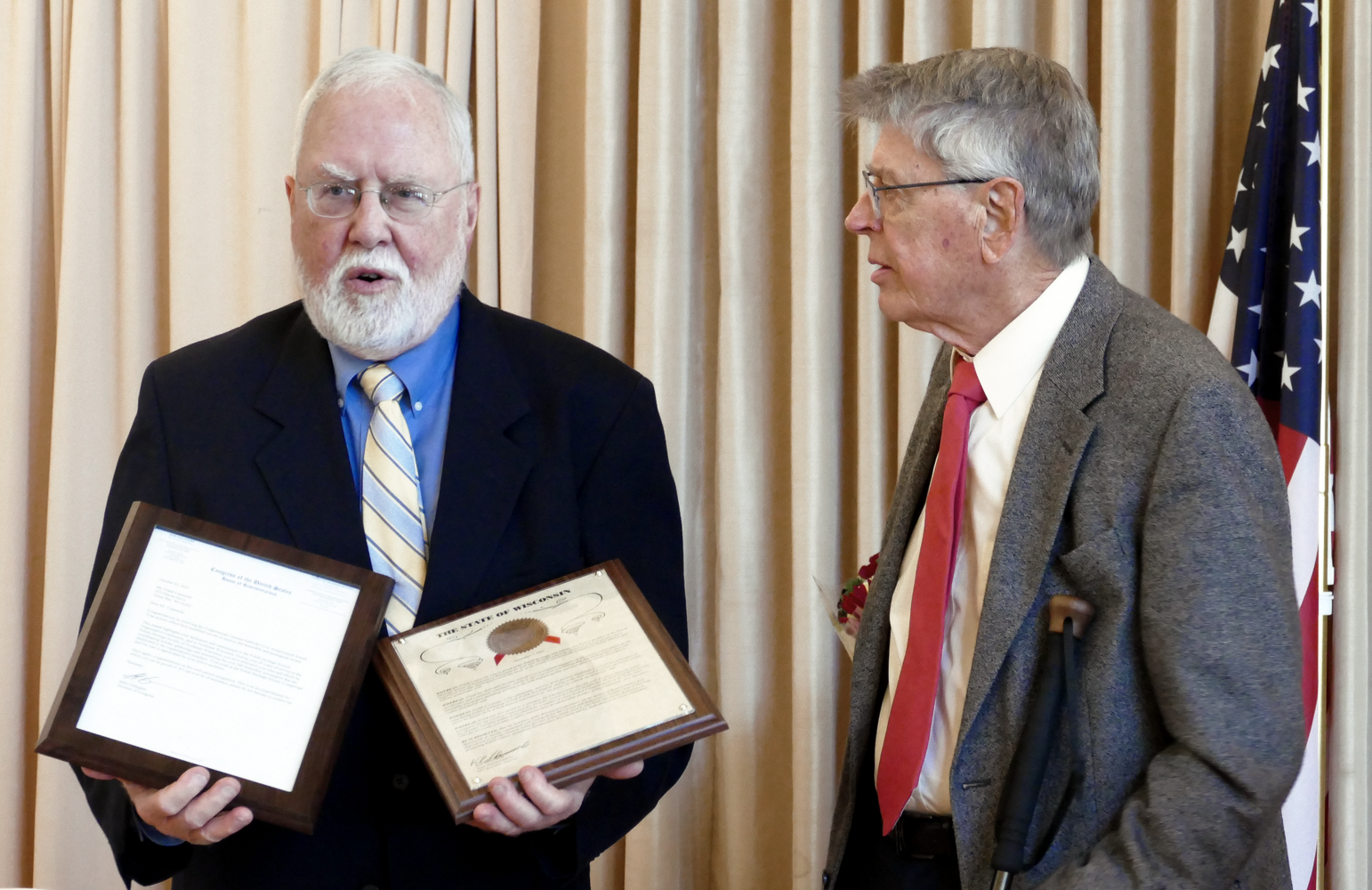
FRANK CZARNECKI was born in Hamtramck, Michigan, which was a Polish enclave surrounded by Detroit. That put him on track to appreciate and love his Polish heritage. He studied Polish from first grade through twelfth, and then took it for two years in college. Unfortunately, all those classes focused on vocabulary and grammar, not conversation. Frank regrets that he was never been a fluent speaker of Polish.
He knows many of the seasonal songs (Christmas and Easter), Marian songs, songs to St. Joseph and St. Francis, as well as Gorzkie Żale. His Śpiewnik Koscielny is a treasured possession.
Growing up, Franks’s family celebrated Wigilja with the sharing of the oplatek. Groch z kapusta was served (But not a favorite of his). To him it was SO dry. All the kids in the family had some wine. The amount was determined by their age. His mom prepared the usual Easter basket for blessing at church on Holy Saturday.
Frank and his children continue the sharing of the opłatek on Christmas Eve. They sing Christmas carols. He permits himself a chance to sing two or three kolędy.
He has been a member and/or board member of the Polish Heritage Society of Northeast Wisconsin for many years. He enjoys its internal activities (mostly potlucks), and its external activities such as a kiosk at Art Street, Pulaski Polka Days, and Arty Gras.
Besides activities related to his Polish heritage, he also volunteers at Literacy Green Bay (teaching English to immigrants) and drives for Curative Connections which provides inexpensive rides for the elderly and handicapped to appointments, shopping, and other activities.
Frank adds “I have to share one more activity and encourage you, if you are able, to give it serious consideration once the pandemic concerns are over. I went to Poland twice with Global Volunteers – once to Siedlce and the other to Zakopane. Our purpose was to give Poles, who are studying English, an opportunity to practice and interact with native English speakers. It was a wonderful experience. We lived right with the students. On one trip I took a teenage nephew (whose heritage is Danish). He is still in touch with several of our students. He returned to the U.S. and took two years of Polish at UW – Milwaukee. He has been accepted at a Polish university (I want to say Wroclaw) where he intends to get his master’s degree. You do not have to be a teacher to serve in this program. You just have to be a native speaker of English. It’s what you have been doing all your life!.”
Lastly, Frank’s joy in service to others is matched by his joy in learning about and experiencing the world where he has traveled to all seven continents.
Frank, you are a real inspiration to us.
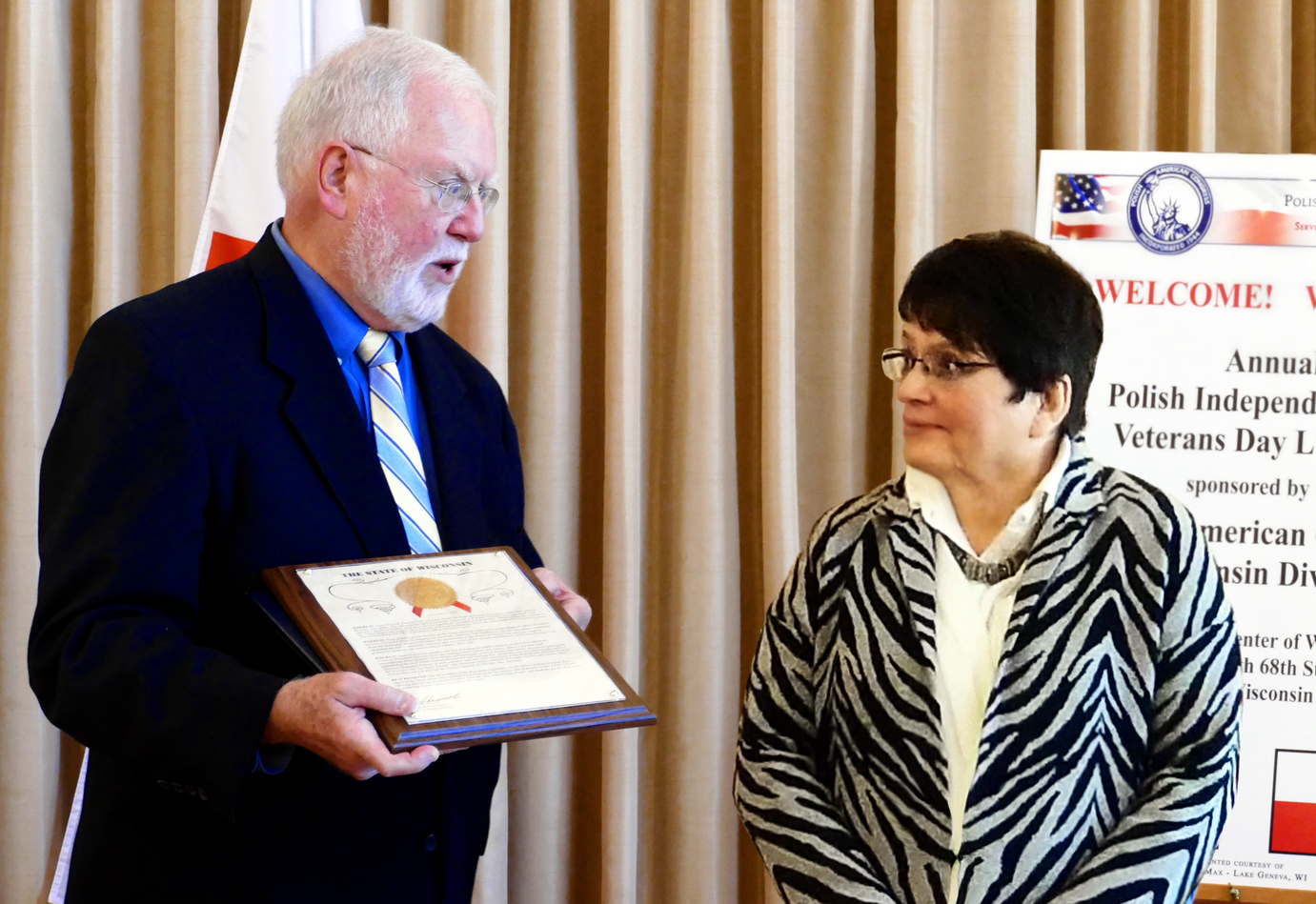
IRENA FRACZEK is a native of Poland and a graduate of the University of Warsaw, where she earned a Master’s degree. Winning a Kosciuszko Foundation Scholarship enabled her to come to the United States and study at the University of Wisconsin-Madison, where she later taught environmental science and participated in the UW’s very first steps in online instruction.
Irena is a member of the Polish Heritage Club Wisconsin-Madison where she runs the club website and participates in activities that expand the club’s outreach and community connections (e.g. bringing the “Auschwitz Exhibit” to the UW-Madison campus or coordinating sponsorship of the “Flavor of Poland” PBS series). The PHC recognized Irena’s special contributions by granting her an honorary life membership in January 2021.
Irena is also an active member and Vice President for Public Relations of the Polish American Congress-Wisconsin Division, where she manages the PAC website and creates the majority of its content.
Irena’s keen insight into Poland’s history and culture has been an important part of the message she delivers to the PHC’s and PAC’s members through the websites and which she shares at live talks and presentations throughout Wisconsin. Her feature stories and reports have been published in local Polish-themed publications and the national PAC newsletter. She also uses her amazing photographic skills to create the visual records of Wisconsin Polonia at work and play.
Irena was a key contributor to the development and final form of the brochure “Do You Know Poland,” which won acclaim and a grant from the Polish Consulate in Chicago. 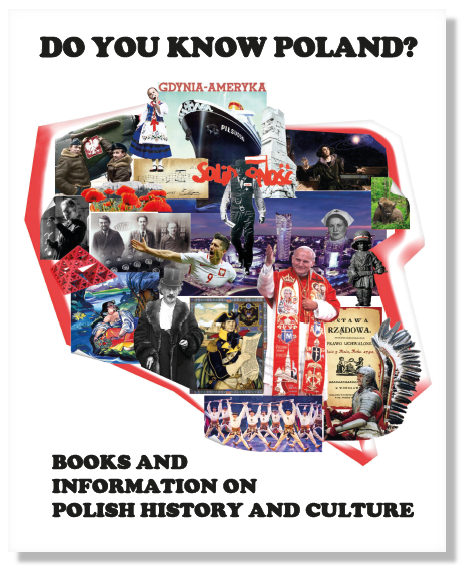 Combining knowledge with a keen sense of design, she created the memorable booklet’s front cover that provided inspiration for the “Do You Know Poland?” competition by showing iconic elements of Poland’s history & culture.
Combining knowledge with a keen sense of design, she created the memorable booklet’s front cover that provided inspiration for the “Do You Know Poland?” competition by showing iconic elements of Poland’s history & culture.
For anyone lucky enough to know Irena, they know that her warm and gracious manner makes her a real people person, and this has helped develop connections between Polish organizations across Wisconsin.
Irena, we’re proud to know you.
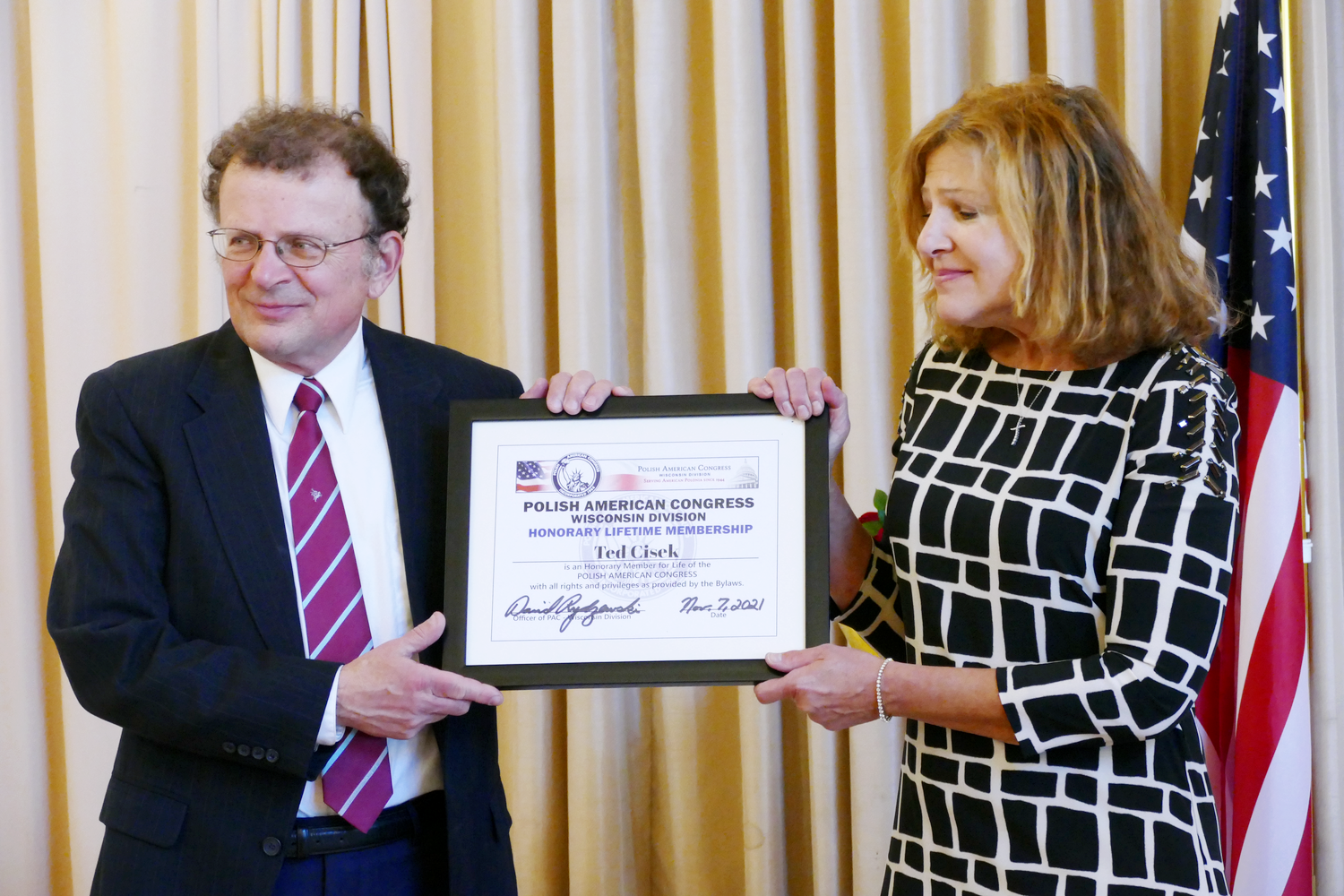
TADEUSZ CISEK: A little over 77 years ago a young Polish paratrooper climbed into a transport aircraft, that hours later would put him and General Stanisław Sosabowski and the 1st Polish Parachute Brigade into occupied Holland, outside Arnhem. They were part of Operation Market Garden. It was the Allied attempt to outflank stiff German opposition in a make or break effort to cross the Rhine into Germany, and shorten the war.
In September 2019, Tadeusz Cisek returned to Arnhem and Driel, Netherlands at the invitation of the Dutch government in a 75th Anniversary tribute to those Polish soldiers. European dignitaries, Polish General staff, and hundreds of current Polish soldiers joined in the observance. It was a glowing tribute to the distinguished effort of the 1st Polish Parachute Brigade over 75 years ago.
It’s an amazing story, but there is so much more to tell about Mr. Cisek.
On September 1, 1939, Hitler’s Germany attacked Poland and ended the chance for a normal life for Ted – he was just fifteen years old. World War II had begun. Just seventeen days later Josef Stalin’s Soviet Army invaded eastern Poland where Ted and his family lived – that village is now in the Ukraine. This invasion was part of a monstrous and secret deal be-tween Stalin and Hitler to destroy the Polish state – and its people.
In February 1940 Ted, his family and thousands of others in Soviet occupied Poland were forcibly deported in overcrowded box cars and dropped into desolate Kazakhstan. Over the next twenty months the more than one million Poles shipped off to Siberia and Soviet Central Asia would suffer starvation, harsh weather, disease, and untold privations. By War’s end most had perished.
Ted says of this time, in his own words: “We were forced to endure hard labor and succumbed to hunger, malnutrition, and diseases. I lost five members of my immediate family. My own fate was harsh as well. While in exile, I contracted typhoid fever, I was one of the lucky ones to survive. Then, during the harsh winter, I frequently looked for any means to keep warm, burning whatever I could find. During one attempt to obtain wood, I was arrested and imprisoned for my infraction.”
In June 1941 Nazi Germany attacked Stalin’s Russia, its supposed ally… A desperate Stalin agreed to permit Poles in the Soviet Union to leave the country and form an army to fight the Germans.
This allowed Ted and other young men to leave. It took months for Ted to get to Allied lines in Egypt. From there he was inducted into the Polish Army, and in his first duty was ordered to guard prisoners on a ship that went around Africa in route to Halifax, Nova Scotia. From there Ted got to New York, where he was quickly sent to England for formal military training as a paratrooper. September 1944 found him fighting in Holland.
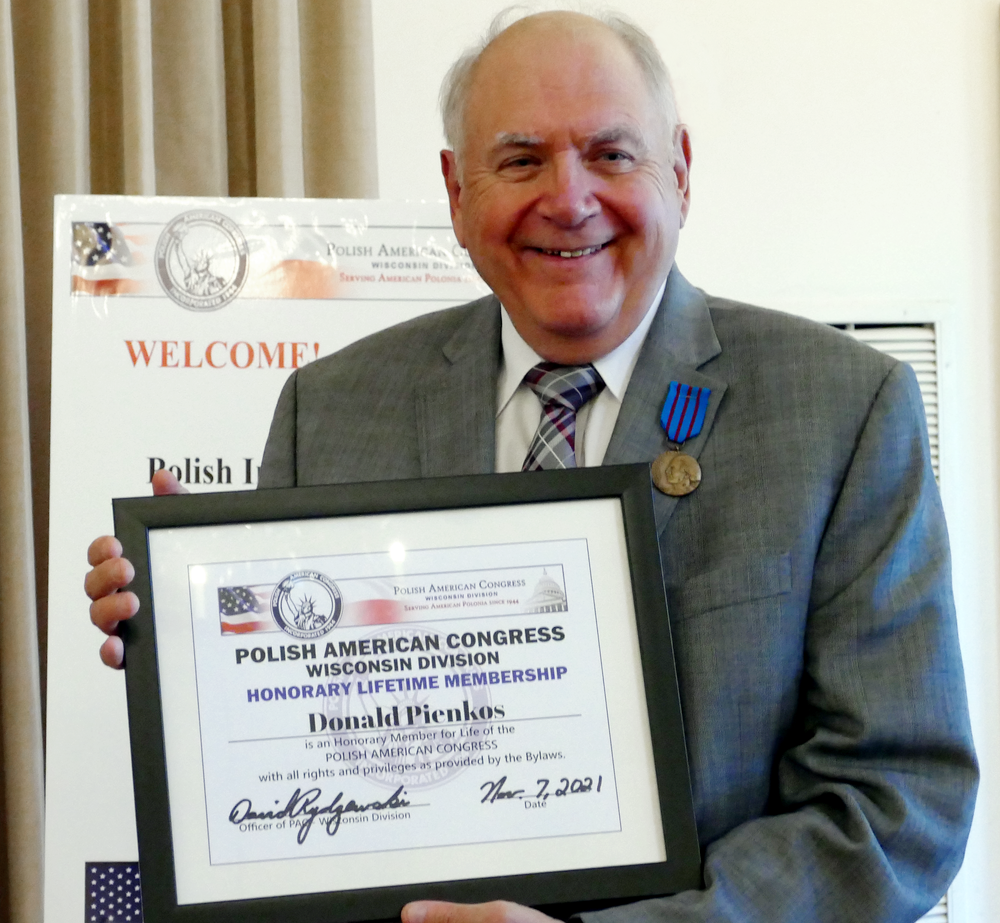
Professor DON PIENKOS was born in Chicago in 1944, a grandson of immigrants from the Austrian zone of partitioned Poland, who settled there just before World War I.
Don was blessed to be part of a wonderful family. He benefitted from an education where he learned much about his heritage. In 1964 he began his graduate studies at the University of Wisconsin.
There not only did he have outstanding professors in political science and Russian area studies, it was in Madison where he met a fellow graduate student – Angela Mischke. They married in 1967. Together they travelled to Poland many times and have been especially blessed with a warm and loving family.
From 1969 until he retired in 2013, Don taught Soviet and post Soviet Russian politics as a member of the UW-Milwaukee Political Science Department. He created courses on the Politics of Eastern Europe and American ethnic groups and published extensively.
In 1970 Don was a founder of UW-Milwaukee’s Russian and East European Studies program. In 1979 he organized its Polish Studies Committee. Both have been incredibly active bodies.
In 1976, Don became a member of the Polish American Congress, where he later served as its state president and as a national PAC director. In 1991 he published the official history of the Polish American Congress, For Your Freedom Through Ours: Polish American Efforts on Poland’s Behalf.
Don was also a national director of the Polish National Alliance, president of the Polish American Historical Association, and a Director of the Polish Institute of Arts and Sciences of America.
In 1992, Don was a delegate to the First World Congress of Poles. This great family of Polonia reunion, brought together delegates from over fifty countries to the newly free and independent Poland.
From 1994 Don and many others worked for Poland’s admission into the NATO Alliance, a success spearheaded by the Polish American Congress.
In 1998, as Wisconsin PAC President, Don and his fellow officers organized the first Polish Independence Day – Veterans Day dinner.
In the early 2000’s he helped in the work to restore our great Kosciuszko Monument.
In 2010 Don received the Officers Cross of Service from the President of Poland.
Don continues to write, do book reviews, and lecture. He actively supports the Milwaukee Society of the Polish National Alliance, the national PNA, the Polish Heritage Alliance, the PAC, and all good initiatives on behalf of our heritage, Poland and strong Poland-U.S. relations.
After the War, Ted remained in England, refusing to return to Soviet occupied Poland. He emigrated to the United States thanks to our Congress’ passage of the Displaced Person Act. He first lived in Chicago , and in 1953 he and Lillian were married. They had two children Edward and Elizabeth who are here representing him today and four grandchildren. Ted and Lillian later moved to Wisconsin.
In Milwaukee, Ted became active in Polonia Sport Club, the Polish Army Veterans Association and the Polish National Alliance. In uniform, he took part in our patriotic observances, like Polish Constitution Day. In the 1990’s he joined the Wisconsin Division of the Polish American Congress, where for years he was Treasurer.
Ted is a gentleman and a gentle man, with the heart of a lion. His contributions to Poland and to American Polonia have been countless.
Ted, this quiet man has been recognized for who he is. He has been honored by the Government of free Poland, by the Queen of the Netherlands for helping to liberate her country in the War, by the Pulaski Council of Milwaukee County, by the Polish Army Veterans, the Polish Legion of American Veterans and by our PAC.
We not only congratulate Ted today. We thank the Good Lord for bringing Ted to us. Our thoughts go to Ted today, and to his children and grandchildren, and we offer them this PAC Honorary Member-ship as a sign of our respect and appreciation for all he has done and means to us.
2021 Polish Independence Day and Veterans Day Luncheon
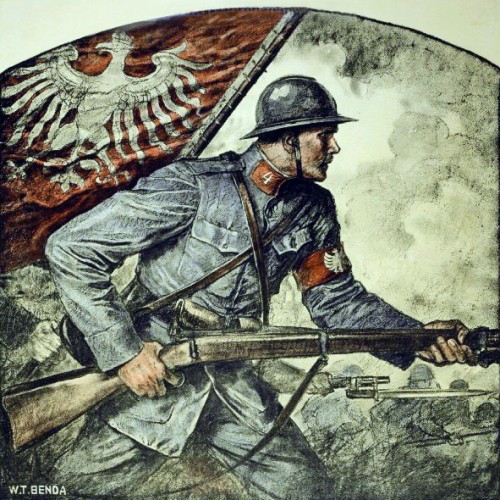
Polish American Congress Wisconsin Division
cordially invites all to the
POLISH INDEPENDENCE DAY
VETERANS DAY LUNCHEON
Sunday, November 7, 2021
POLISH CENTER OF WISCONSIN
6941 S. 68th Street Franklin, WI 53132
► Map of Location ◄
Cash Bar and Raffle: 12:00 pm
Luncheon 1:00 pm
Cost: $30.00 per adult member ($40.00 per non-member), $15.00 per child 12 and under
For additional information, please contact
David Rydzewski at (414)964-2447 or david.rydzewski@att.net
2021 Prof. Pienkos lecture: Polish Vote in US Presidential Elections
Is There a ‘Polish Vote’
in U.S. Presidential Elections?
Lecture presented on October 20, 2021
by Dr Donald Pienkos
Professor Emeritus of Political Science
University of Wisconsin-Milwaukee
This is a question that should get a quick YES answer. But a far more interesting question is whether Polish American voters have played a significant role in affecting the outcome of U.S. presidential elections – the most important decision we make as citizens.
To download the lecture handout, click on the image above or
► download the handout here ◄
We have plenty of information to back up the reality of Polish Americans as voters in presidential elections. For example, in Wikipedia, there is an entry that gives plenty of survey data on the Polish vote in U.S. presidential elections going back all the way to 1916 – over 100 years!
Of course the Polish vote has changed over time, due to the transformation of the Polish population in the United States from immigrant status to full integration into the American ‘melting pot’.
Back in 1916 there were about 4 million people of Polish origin in the U.S. – out of about 100 million in all – or 4 percent of the population. But a third of them were immigrants. Most of them were not yet citizens and could not vote. And many of their American born children were too young to vote. Thus, the “Polish vote” in 1916 was just a ‘tweence’ over 1 percent of the total vote for President that year. Not much.
But by 1940 – things had changed dramatically. By then nearly all of the immigrants had become citizens and they and so many of their American-born children and even some of their grandchildren had reached voting age. So by 1940, Polish Americans made up perhaps 5 or even 6 percent of the voting population. This was an enormous change – something politicians very well recognized!
Since then the Polish American population has continued to change.
 Today only about 4 percent of all Polish Americans are foreign born. Few Polish Americans – whether they are the sons and daughters, grandchildren or descendants of immigrants – speak Polish fluently. Far fewer are in ethnic organizations of any kind whether we are talking about their belonging to ethnically based parishes or fraternals. Polish Americans are far more economically diverse too. And politically, Poles have gone from being 90 percent for the Democratic party in the 1930s and 1940s to identifying slightly more as Republicans than as Democrats – since the 1970s.
Today only about 4 percent of all Polish Americans are foreign born. Few Polish Americans – whether they are the sons and daughters, grandchildren or descendants of immigrants – speak Polish fluently. Far fewer are in ethnic organizations of any kind whether we are talking about their belonging to ethnically based parishes or fraternals. Polish Americans are far more economically diverse too. And politically, Poles have gone from being 90 percent for the Democratic party in the 1930s and 1940s to identifying slightly more as Republicans than as Democrats – since the 1970s.
Today about 3 percent of all Americans continue to identify as Polish – about 9.5 million in all. This decline is due to changing birthrates, the entry of many new immigrations into the country and Polish Americans’ own full and successful integration into the mainstreams of American life.
Still, they have remained a factor in elections – including presidential elections – especially under two conditions – when the election is closely contested and when Poland is a salient issue.
The reality of a Polish vote is also due to another important fact – that most Polish Americans live in just 10 states of the United States – New York, Pennsylvania, New Jersey, Maryland, Connecticut, and Massachusetts, and in the east and Illinois, Michigan, Ohio and Wisconsin in the Midwest.
Back in 1940 about 7 out of every 8 Polish Americans lived in these ten states – 86 percent. In 1980, 77 percent lived in them. In 2018 61 percent were residing in those same ten states.
In 2020 Polish Americans made up 8.6 percent of Wisconsin’s population, 8.3 percent in Michigan, 7.3 percent in Connecticut, 6.8 percent in Illinois and Pennsylvania, 5.5 percent in New Jersey, 5.4 percent in New York, 4.5 percent in Massachusetts, 3.7 percent in Ohio and 3.1 percent in Maryland. In other words they could matter in our presidential elections when they are close.
Indeed, we have plenty of good information to conclude that in four closely fought presidential elections Poland was an issue of significance. And in them the Polish vote mattered a great deal.
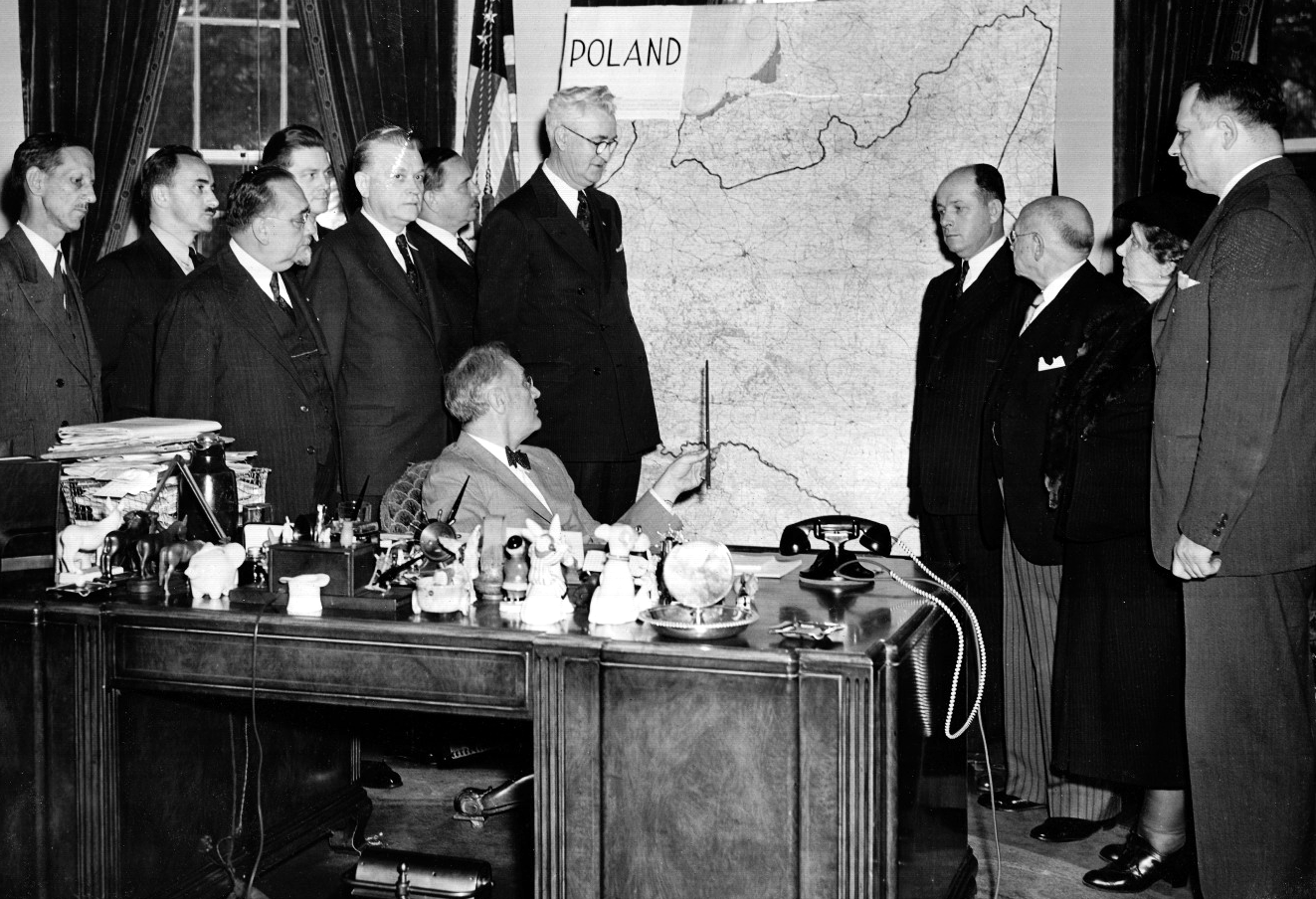
On October 11, 1944: President Franklin D. Roosevelt meets in the Oval Office with Polish American Congress leaders to mark the annual Pulaski Day observance and just weeks before the November election. Behind the President is a map of pre 1939 Poland whose borders the President had privately ceded to Soviet Russia’s ruler Josef Stalin the year before.
These elections took place in 1944, 1948, 1960, and 1976. Here’ let’s look at each of them more closely.
In 1944 Franklin D. Roosevelt, who was revered by Polish Americans and most other Americans because of his inspired leadership during the Great Depression and in World War II, won an unprecedented fourth term in office – and with the support of 90 percent of Polish voters. He did this, however, helped by his success in concealing vital information from the public about the private agreement he had made with Soviet ruler Josef Stalin about postwar Poland the year before.
In the election Roosevelt won 8 of the 10 states with the largest numbers of Polish voters, several of them by very narrow margins, in winning the election. In all he got 177 electoral votes from these ten states out of the 266 he needed to win. He lost only the 37 electoral votes of Ohio and Wisconsin. Now what might have happened had the “political dynamite” about his truly damaging talk with Stalin exploded before the election?
In 1948, Harry Truman barely won the presidency despite his losing some Polish voter support due to their anger over Poland’ fate following the Yalta conference of February 1945.
At Yalta, Churchill had accepted Soviet control over postwar Poland and a massive change in its borders. Indeed, the Polish American Congress denounced their action from the start as a violation of the very reasons the two leaders had given for fighting against Hitler.
In the 1948 election Truman did win 80 percent of the Polish vote, 10 percent less than in 1944. Moreover, he won only 4 of the ten states with the largest number of Polish Americans. And in two of those – Ohio and Illinois – his margin of victory was very narrow. He just squeaked in – thanks to his furious ‘whistle stop’ campaign to mobilize Democratic party voters – who then outnumbered Republicans nearly 2-1.
In 1960 Senator John F. Kennedy, like his opponent, Vice President Richard Nixon, was a staunch supporter of a Poland free from Soviet domination. Both candidates made strenuous efforts to win the Polish vote too.
Kennedy based his campaign on rebuilding Franklin Roosevelt’s “New Deal’ Coalition in a time of economic recession in our country. He went on to win the election by the narrowest of margins, helped enormously by the votes from nearly 80 percent of Polish Americans – 8 of the ten “Polish” states went to him, two again by very narrow margins – Illinois by 8,000 votes out of 4.8 million and New Jersey – by 22,000 votes out of 2.8 million. Without them the election would have been decided in the House of Representatives.
In 1976, President Gerald R. Ford narrowly lost his bid for office against Jimmy Carter in an election in which he committed an egregious debate blunder declaring that communist-run Poland was not under Soviet domination. Polish Americans, after voting Republican in 1972, went to Carter by a 60-40 margin, and were a key factor in bringing about his defeat. Ford lost 6 of the 10 most heavily Polish states – all ten had gone to Nixon in his landslide win in 1972. Later Ford himself blamed his defeat on his debate error, something connected with the so-called “Sonnenfeldt doctrine” that had plagued him before the election.
In the 1990s, one issue that never arose involved the newly free and democratic Poland’s entry into the NATO alliance. When both Democrats and Republicans came out in support of NATO expansion this issue was literally “taken off the table.” Thus, it played no role in 2000, when George W. Bush won the presidency in an amazingly close and controversial election.
Does the Polish vote still matter today? Yes I would argue, but only when the fate of Poland is salient, when the candidates recognize this fact, and the election is close. Thus, while the votes in three states with large populations of Polish Americans u– Pennsylvania, Michigan, and Wisconsin were crucial in Donald Trump’s narrow victory in 2016 and his defeat in 2020, in these elections Polish Americans like their fellow Americans were voting on the candidate and the issues, based on their own particular party orientations, views of the candidates, and their policy preferences.
As for the future, let’s just hope and pray that Poland’s fate is not in the balance in the years to come when it involves our presidential elections.
Questions?
Archived Posts
- 2024 Polish Constitution Day in Wisconsin
- 2023 Merry Christmas
- 2023 Lighting the Light of Freedom on Dec 13 at 7:30pm
- Independence Day and Veteran Day invitation
- 2023 Wianki Festival
- 2023 May 3rd Constitution Day Celebration
- 2023 Lecture on Polish Borders by Prof. Don Pienkos
- 2023 REMEMBER THIS: Jan Karski movie premieres on PBS Wisconsin
- 2023 Upcoming lectures in the Polish Center of Wisconsin
- 2022 Polish National Independence Day
- 2022 Independence and Veteran Day Luncheon (invitation)
- 2022 Wianki, Polish Celebration of Noc Świętojańska (St. John’s Night)
- Celebrating Constitution of May 3, 1791 in Polish Center of Wisconsin
- 2022 Polish Constitution Day, Polish Flag Day and the Day of Polonia
- 2022 March Bulletin
- 2022 Polonia For Ukraine Donations
- 2022 Polish American Congress Condemns Russian Invasion of Ukraine
- 2022 PAC-WI State Division Letters to WI Senators and Representatives
- 2021 Polish Christmas Carols
- 2021 Panel Discussion: Martial Law in Poland 1981-1983 (REPORT)
- 2021 Panel Discussion: Martial Law. Poland 1981-1983 (invitation)
- 2021 Solidarity: Underground Publishing and Martial Law 1981-1983
- 2021 Polish Independence Day and Veterans Day
- 2021 Polish Independence Day and Veterans Day Luncheon
- 2021 Prof. Pienkos lecture: Polish Vote in US Presidential Elections
- 2021 POLISH HERITAGE MONTH EVENTS
- 2021 “Freedom” Monument Unveiled in Stevens Point, Wisconsin
- 2021 PCW Picnic and Fair
- 2021 Remembering Września Children Strikes (1901-1903)
- 2021 May 3 Constitution Day
- 2021 DYKP Contest Winners and Answers
- 2021 DYKP CONTEST EXTENDED and CASIMIR PULASKI DAY
- 2021 February announcements
- 2021 Polish Ministry of Education and Science oficials visit Wisconsin
- 2021 DYKP Contest, KF Gallery and Dr. Pease lectures
- 2020 Help Enact Resolution commemorating the 80th Anniversary of the Katyn Massacre
- 2020 Independence And Veterans Day
- 2020 Remembering Paderewski
- 2020 POLISH HERITAGE MONTH
- 2020 Solidarity born 40 years ago
- 2020 Battle of Warsaw Centenary
- 2020 The Warsaw Rising Remembrance
- 2020 June/July News: Polish Elections, Polish Films Online and more
- 2020 Poland: Virtual Tours
- Centennial of John Paul II’s Birth
- 2020 Celebrating Polish Flag, Polonia and Constitution of May 3rd
- 2020 Polish Easter Traditions
- 2020 Census and Annual Election
- Flavor of Poland (Update 3)
- 2020 Copernicus, Banach & Enigma talk
- 2020 Do You Know Poland and other announcements
- 2020 Flavor of Poland (Update 2)
- 2020 People and Events of the Year
- 2019 Holidays
- 2019 December Medley
- 2019 Independence Celebration
- 2019 Independence Invitation
- 2019 WI Study in Poland Reports
- Lecture: Poland’s Entry Into the NATO
- August 2019 anniversaries
- 2019 Polish Fest
- Celebrating Polish Constitution and Ignacy Paderewski
- WSIP 2018 Reports (Wisconsin Study in Poland)
- 2018 Christmas Carols
- 2018 Polish Independence and Veterans Day
- November 2018 events
- October 2018 Events
- 2018 Kashube Lecture Notes
- September 2018 events
- 2018 Polish Fest Report
- Upcoming 2018 Polish Fest
- Celebrating Polish Constitution Day
- Poland 1979-1989 (panel discussion)



